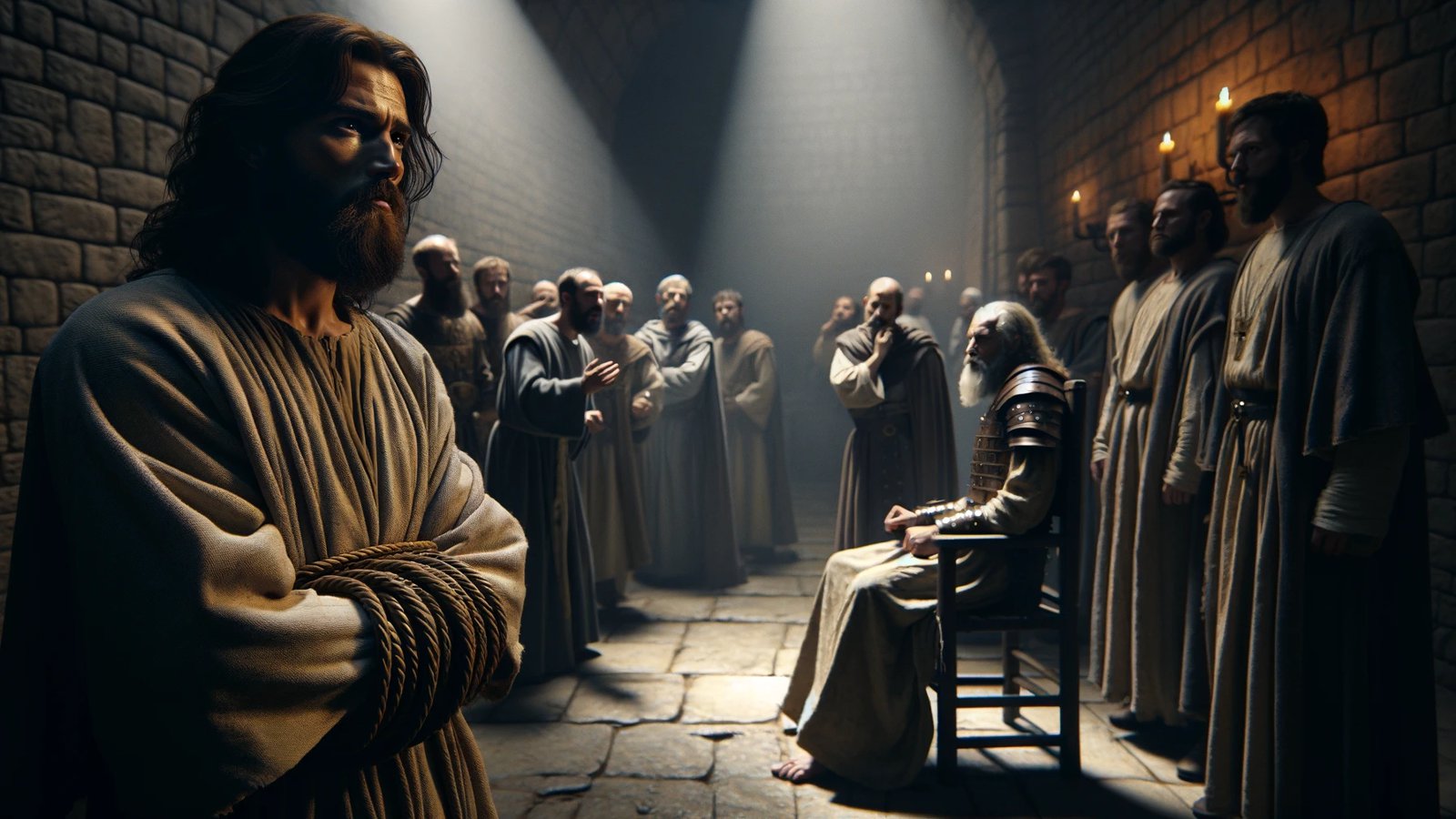Home>Theology and Spirituality>What Was Special About John The Baptist Birth


Theology and Spirituality
What Was Special About John The Baptist Birth
Published: February 20, 2024
Peter Smith, Editorial Director at Christian.net, combines deep insights into faith, politics, and culture to lead content creation that resonates widely. Awarded for his contributions to religious discourse, he previously headed a major organization for religious communicators, enhancing dialogue on faith's societal impacts.
Discover the significance of John the Baptist's extraordinary birth and its impact on theology and spirituality. Explore the unique aspects of his birth narrative and its relevance in religious teachings.
(Many of the links in this article redirect to a specific reviewed product. Your purchase of these products through affiliate links helps to generate commission for Christian.net, at no extra cost. Learn more)
Table of Contents
Introduction
The birth of John the Baptist is a remarkable event that holds profound significance in Christian theology and spirituality. It is a story steeped in divine prophecy, miraculous conception, and the fulfillment of God's plan. The narrative of John the Baptist's birth is intricately woven into the fabric of the New Testament, serving as a prelude to the arrival of Jesus Christ and heralding a message of repentance and spiritual renewal.
This pivotal moment in biblical history is not merely a tale of a miraculous birth, but rather a testament to the divine orchestration of events and the fulfillment of ancient prophecies. The account of John the Baptist's birth sets the stage for the unfolding of God's redemptive plan for humanity, marking the beginning of a new era in the spiritual landscape.
The birth of John the Baptist is a testament to the power of faith, the fulfillment of divine promises, and the profound impact of individuals chosen to play pivotal roles in the grand narrative of salvation history. As we delve into the details of this extraordinary event, we are invited to contemplate the intricate tapestry of divine providence and the profound implications of John the Baptist's role in preparing the way for the Messiah.
This article will delve into the prophecy of John the Baptist's birth, the miraculous conception of Elizabeth, the angel's announcement to Zechariah, and the overarching significance of John the Baptist's birth in the larger narrative of Christian faith. Through this exploration, we will gain a deeper understanding of the spiritual and theological implications of this extraordinary event, shedding light on its enduring relevance and timeless message of hope and redemption.
Read more: What Is John The Baptist Birth Date
The Prophecy of John the Baptist's Birth
The prophecy of John the Baptist's birth is rooted in the rich tapestry of biblical history, echoing the age-old promise of a herald who would prepare the way for the coming of the Messiah. This profound prophecy finds its origins in the Old Testament, specifically in the book of Malachi, where the prophet foretells the arrival of a messenger who will pave the way for the Lord's coming. The words of Malachi resonate with anticipation and divine purpose, setting the stage for the fulfillment of this prophetic proclamation.
The prophecy of John the Baptist's birth is intricately linked to the lineage of his parents, Zechariah and Elizabeth, who are described as righteous and devout individuals in the eyes of God. Their lineage can be traced back to the priestly lineage of Aaron, infusing their family history with a deep sense of spiritual heritage and significance. Against the backdrop of their devout lives, the prophecy takes on a deeply personal dimension, as it becomes intertwined with the lives of this faithful couple.
The prophecy unfolds with a sense of divine timing and purpose, as the angel Gabriel appears to Zechariah while he is serving in the temple. Gabriel delivers the astounding news that Elizabeth, despite her advanced age and previous inability to conceive, will bear a son who will be named John. This revelation serves as the fulfillment of the prophecy uttered by Malachi centuries earlier, signaling the imminent arrival of the messenger who will prepare the hearts of the people for the coming of the Messiah.
The prophecy of John the Baptist's birth is a testament to the faithfulness of God in fulfilling His promises and the intricate interplay of divine sovereignty and human agency. It serves as a poignant reminder that God's plans unfold according to His perfect timing, often defying human expectations and transcending the limitations of the natural order. The fulfillment of this prophecy sets the stage for the extraordinary events that will follow, as John the Baptist emerges as a pivotal figure in the unfolding drama of redemption and spiritual renewal.
In essence, the prophecy of John the Baptist's birth stands as a testament to the enduring faithfulness of God and the profound significance of individuals chosen to play integral roles in the divine narrative. It serves as a beacon of hope and a reminder that God's promises, spoken through the ages, find their fulfillment in the most unexpected and extraordinary ways, shaping the course of human history and ushering in a message of salvation and grace.
This section provides a glimpse into the profound significance of the prophecy of John the Baptist's birth, setting the stage for the miraculous events that will unfold in the narrative of Christian faith.
The Miracle of Elizabeth's Conception
The miracle of Elizabeth's conception stands as a testament to the awe-inspiring power of divine intervention and the fulfillment of God's extraordinary promises. At an advanced age and long past the years of childbearing, Elizabeth found herself in the midst of a profound and miraculous encounter with the divine. The news of her impending conception, delivered by the angel Gabriel, defied the natural order and transcended the boundaries of human understanding.
Elizabeth's barrenness, a source of deep sorrow and societal stigma, was transformed into a testament of God's miraculous intervention. The conception of John the Baptist was not merely a biological occurrence, but a divine proclamation of God's sovereignty over the limitations of the human condition. It was a miraculous sign that heralded the arrival of a chosen messenger, destined to play a pivotal role in the unfolding drama of redemption and spiritual renewal.
The miracle of Elizabeth's conception serves as a poignant reminder that nothing is impossible with God. It defies the constraints of human logic and underscores the profound truth that God's plans often unfold in ways that surpass human comprehension. The miraculous conception of John the Baptist through Elizabeth stands as a testament to the divine orchestration of events, affirming the enduring power of faith and the fulfillment of God's purpose in the most extraordinary and unexpected ways.
This miraculous event not only brought immeasurable joy to Elizabeth and Zechariah but also carried profound implications for the larger narrative of salvation history. It signaled the imminent arrival of a figure whose life and ministry would leave an indelible mark on the spiritual landscape, preparing the hearts of the people for the coming of the long-awaited Messiah.
The miracle of Elizabeth's conception serves as a powerful testament to the transformative nature of divine intervention and the profound impact of individuals who become vessels for God's extraordinary work. It stands as a timeless testament to the enduring power of faith, the fulfillment of divine promises, and the miraculous unfolding of God's redemptive plan for humanity.
The Angel's Announcement to Zechariah
The angel's announcement to Zechariah stands as a pivotal moment in the narrative of John the Baptist's birth, marking the divine initiation of a profound and transformative journey. As Zechariah fulfills his priestly duties in the temple, he encounters the angel Gabriel, who delivers a message that will forever alter the course of his life and the destiny of his family.
Gabriel's appearance to Zechariah is shrouded in awe-inspiring splendor, evoking a sense of divine presence and purpose. The angel's proclamation carries the weight of centuries-old prophecies and the fulfillment of God's redemptive plan. In this extraordinary encounter, Gabriel reveals to Zechariah that his prayers have been heard, and his wife Elizabeth will conceive and bear a son, who will be named John. This revelation is met with incredulity by Zechariah, who expresses his disbelief due to the advanced age of both himself and his wife.
The angel's announcement to Zechariah serves as a profound testament to the intricate interplay of human doubt and divine assurance. Zechariah's initial disbelief is met with a declaration of divine authority, as Gabriel identifies himself as one who stands in the presence of God. This exchange underscores the transformative power of faith and the profound implications of embracing God's promises, even in the face of seemingly insurmountable obstacles.
As a consequence of his initial doubt, Zechariah is rendered mute until the fulfillment of the angel's words. This period of silence serves as a time of introspection and spiritual preparation, as Zechariah contemplates the magnitude of the divine encounter and the unfolding of God's extraordinary plan. It is a period of profound significance, as it underscores the transformative power of divine encounters and the call to embrace God's promises with unwavering faith.
The angel's announcement to Zechariah serves as a poignant reminder of the transformative nature of divine encounters and the profound impact of embracing God's promises with unwavering faith. It sets the stage for the miraculous events that will follow, as Zechariah and Elizabeth become integral participants in the unfolding drama of redemption and spiritual renewal.
In essence, the angel's announcement to Zechariah is a testament to the enduring power of faith, the fulfillment of divine promises, and the transformative nature of embracing God's extraordinary plan. It marks the beginning of a journey that will culminate in the birth of John the Baptist, a figure destined to play a pivotal role in preparing the way for the coming of the Messiah.
The Significance of John the Baptist's Birth
The birth of John the Baptist holds profound significance in the narrative of Christian faith and spirituality. As the fulfillment of ancient prophecies and the miraculous intervention of God, John's birth marks the dawn of a new era in the spiritual landscape. His role as the herald preparing the way for the Messiah imbues his birth with enduring significance and timeless relevance.
John the Baptist's birth signifies the faithfulness of God in fulfilling His promises. It serves as a testament to the divine orchestration of events, defying the constraints of human understanding and transcending the limitations of the natural order. The miraculous conception of John through Elizabeth, a woman of advanced age and previously unable to conceive, underscores the transformative power of divine intervention and the fulfillment of God's extraordinary promises.
Furthermore, John's birth heralds a message of repentance and spiritual renewal. His life and ministry embody a call to prepare the hearts of the people for the imminent arrival of the Messiah. His uncompromising proclamation of repentance and the impending arrival of the Kingdom of God resonates with timeless significance, inviting individuals to turn their hearts toward God and embrace a life of spiritual renewal.
John the Baptist's birth also establishes a profound connection to the lineage of the Old Testament prophets, particularly the prophecy of Elijah's return. His role as the fulfillment of the prophecy of Elijah's coming underscores the continuity of God's redemptive plan throughout history. This connection serves as a bridge between the prophetic traditions of the Old Testament and the fulfillment of God's promises in the New Testament, weaving a seamless narrative of divine purpose and fulfillment.
Moreover, John's birth sets the stage for the pivotal role he would play in preparing the way for Jesus Christ, the long-awaited Messiah. His ministry in the wilderness, his baptism of repentance, and his proclamation of the coming Messiah paved the way for the transformative impact of Jesus' earthly ministry. In this sense, John the Baptist's birth serves as a prelude to the unfolding of God's redemptive plan, positioning him as a central figure in the narrative of salvation history.
In essence, the significance of John the Baptist's birth extends far beyond a mere historical event. It embodies the fulfillment of divine promises, the heralding of a message of repentance and spiritual renewal, and the seamless continuity of God's redemptive plan. His birth serves as a testament to the enduring faithfulness of God and the profound impact of individuals chosen to play integral roles in the grand narrative of salvation history.
Conclusion
The narrative of John the Baptist's birth encapsulates a tapestry of divine prophecy, miraculous intervention, and the fulfillment of God's extraordinary promises. It stands as a testament to the enduring faithfulness of God and the transformative power of embracing His divine plan with unwavering faith. The prophecy of John the Baptist's birth, rooted in the ancient prophecies of the Old Testament, finds its fulfillment in the miraculous conception of Elizabeth and the angel's announcement to Zechariah. These extraordinary events serve as a prelude to the arrival of a figure destined to play a pivotal role in preparing the hearts of the people for the coming of the Messiah.
The significance of John the Baptist's birth reverberates throughout the narrative of Christian faith and spirituality. It heralds a message of repentance and spiritual renewal, inviting individuals to turn their hearts toward God and embrace a life of transformative renewal. His role as the fulfillment of the prophecy of Elijah's return establishes a profound connection to the prophetic traditions of the Old Testament, weaving a seamless narrative of divine purpose and fulfillment. Furthermore, John's birth sets the stage for the transformative impact of Jesus' earthly ministry, positioning him as a central figure in the unfolding drama of redemption and salvation.
In essence, the birth of John the Baptist serves as a timeless testament to the enduring faithfulness of God and the profound impact of individuals chosen to play integral roles in the grand narrative of salvation history. It embodies the fulfillment of divine promises, the heralding of a message of repentance and spiritual renewal, and the seamless continuity of God's redemptive plan. As we reflect on the miraculous events surrounding John the Baptist's birth, we are invited to contemplate the intricate tapestry of divine providence and the enduring relevance of his message in our lives today.
The narrative of John the Baptist's birth transcends the boundaries of time and space, carrying a timeless message of hope, redemption, and the transformative power of embracing God's extraordinary plan. It stands as a testament to the enduring faithfulness of God and the profound impact of individuals who become vessels for His extraordinary work. As we ponder the significance of John the Baptist's birth, we are reminded of the profound truth that God's plans unfold in ways that surpass human understanding, shaping the course of human history and ushering in a message of salvation and grace.














